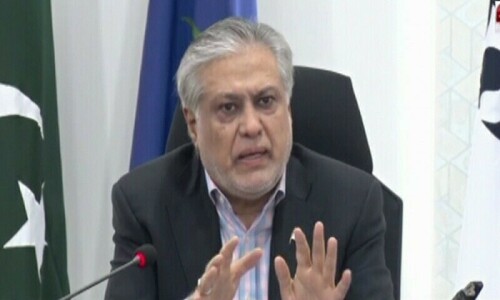Responding to the International Monetary Fund's (IMF) reservations over the fiscal year 2023-24 (FY24) budget tabled in the National Assembly last week, the government expressed willingness on Friday to show flexibility on the matter and said it remained engaged with the international money lender to reach an "amicable solution".
"We are not 'doctrinaire' about any element of the FY24 budget and are keenly engaged with the IMF to reach an amicable solution," the finance ministry said in a statement, adding the government was "fully committed" and "keen" to at least complete the ninth review of a $6 billion IMF programme, which has been stalled since October.
The IMF has made the decision of releasing at least some of the $2.5 billion pending disbursement under the 2019 Extended Fund Facility (EFF) that will expire at the end of this month conditional on multiple factors, including the government satisfying it with regards to the budget for the coming fiscal year.
The IMF's resident representative for Pakistan, Esther Perez Ruiz, said in a late-night statement on Wednesday that the lender had raised several issues in the FY24 budget but was ready to work with Pakistan to refine the budget ahead of its passage.
Ruiz said a new tax amnesty scheme proposed by the government in the budget set a “damaging precedent” and ran against the programme’s conditionality, the FY24 budget “misses an opportunity to broaden the tax base in a more progressive way, and the long list of new tax expenditures reduces further the fairness of the tax system and undercuts the resources needed for greater support for vulnerable BISP (Benazir Income Support Programme) recipients and development spending”.
She further stated that measures to address the energy sector’s liquidity pressures could be included alongside the broader budget strategy.
In its response to her statement, the finance ministry said today that tax exemptions announced in the budget were growth “triggers” in the real sectors of the economy.
"This is the sustainable path to provide employment and livelihood to the common citizen. In any case, the amount is fairly small," the ministry insisted.
As far as the broadening of the tax base was concerned, the ministry said, the Federal Board of Revenue had added over 1.16 million new taxpayers to its tax base in the last 11 months, an increase of 26.38 per cent.
"This is an ongoing exercise and will continue," the ministry said, highlighting that the 0.6pc advance adjustable withholding tax on cash withdrawals over Rs50,000 was another "big step" in this direction.
Addressing the IMF's concerns regarding the tax amnesty, the ministry said the only change made in this regard was to "dollarise" the value of an existing provision of IT Ordinance.
"This facility, which has always been there, was available under Section 111(4) of the IT Ordinance. The cap of Rs10m was introduced in FY2016. The cap set in FY2016 is being resolved in terms of rupee equivalence of $ 100,000," it explained.
On BISP allocations, the government said: "Pro-poor initiatives in the budget are not limited to BISP beneficiaries whose budget in any case has been increased from Rs400 billion to Rs450bn.
"There are millions of vulnerable people above the poverty line and the budget provides Rs35bn for targeted subsidies on five main items of food consumption through the Utility Stores Corporation for families upto a PMT (proxy means test) scorecard of 40. This facility is also available for BISP beneficiaries."
The ministry also assured that the its negotiations with the IMF were ongoing, adding the government completed all "technical issues at a fast pace" when the ninth review for the loan programme was conducted in February.
"The only outstanding issue was of external financing which we understand was also amicably resolved in the prime minister’s telephonic call of May 27, 2023 with the managing director (MD) of IMF.
"Though the FY24 budget was never a part of the ninth review, however in line with PM’s commitment to the IMF MD, we shared the budget numbers with the IMF mission. And we are continuously engaged with them even on the budget."
The ministry further stated that in order to ensure the completion of the ninth review, the ruling coalition in the Centre "has already taken many difficult and politically costly decisions".
With reserves at critical levels for the past several months, Pakistan was expected to get around $1.2 billion from the IMF in October last year as part of the EFF’s ninth review. But almost 8 months later, that tranche has not materialised as the IMF says Pakistan has been unable to meet important prerequisites.
Just weeks away from its expiry, the programme’s ninth review is still in doldrums while the tenth review, which was originally part of the plan, is all but out of question.















































Dear visitor, the comments section is undergoing an overhaul and will return soon.